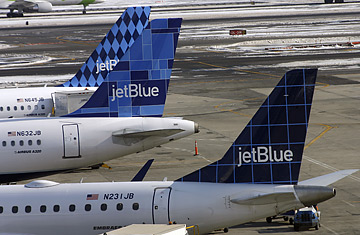
JetBlue airplanes, JFK airport, New York City, Tuesday, February 20, 2007
JetBlue's customers felt anything but protected last week when the airline was forced to cancel more than 250 domestic and international flights in the wake of a crippling ice storm in New York City. Fliers around the world were stranded and honeymoons and business meetings missed. Among the made-for-TV stories that emerged: passengers on nine JetBlue flights were held on the icy tarmac at John F. Kennedy Airport — some for more than 10 hours — with little more than a bit of snack food and some fetid latrines for company.
The disruptions of last Wednesday's storm were compounded when the airline was unable to fully recover in the days that followed. Most of the problems were related to staffing issues. JetBlue, which books 80% of its tickets online, did not have enough reservations agents on its toll-free line to handle all of the rescheduling. At Kennedy Airport, there was not enough trained staff to work on rebooking. And the unit in charge of locating pilots and flight attendants and assigning them to their next flight was overwhelmed. By late Monday, JetBlue had canceled more than 1,000 flights — and some passengers had spent days camped out at airport terminals. In a contrite telephone conference call with reporters on Tuesday afternoon, Neeleman said, "What we did was wrong. We didn't have a plan." He later added: "I just want to send our deepest apologies to everyone affected by this storm."
According to Neeleman, the debacle could end up costing the airline upwards of $30 million in expenses. This comes at a fragile moment for JetBlue, which is just returning to profitability after being hit with skyrocketing fuel prices and other problems. Yet this is hardly the end of JetBlue. Despite the turbulent weekend, the airline has responded quickly. On Tuesday, Neeleman announced a laundry list of improvements to the company's operations. These include more telephone operators to handle manual rebooking in the event of an emergency, improved software systems to track pilots and flight attendants and the creation of a reserve of trained, accredited workers at Kennedy who can jump in and help with flight check-in and baggage handling at a moment's notice.
In response to the incident, JetBlue also put together it's own "Customer Bill of Rights" (just as two Senators were proposing similar legislative measures before Congress). Among other things, the airline will give vouchers of varying amounts to travelers who face extraordinary ground delays and will offer full refunds to passengers whose flights are canceled within 12 hours of departure, so long as the situation is within control of the company.
Michael Boyd, president of the Boyd Group, an aviation consulting firm based in Evergreen, Colo., says that JetBlue will weather the storm. "When it comes to customer service, these people rewrote the book," he says. "The product is damn good. It's just that their operational systems haven't been very robust. But they'll fix that. I bank on it."
JetBlue nonetheless faces quite a bit of mending ahead. On Tuesday, Morgan Stanley downgraded the company's stock. Even so, shares closed at $12.90, just 25 cents below the closing price on the evening before the storm — and well above the 52-week low of $8.93. Neeleman insists that the company will recover. "I wish we could have simulated this on a computer program instead of living it real time," he says of the past few days, later adding: "We learned some huge lessons. They will be ingrained in us for a long, long time."
